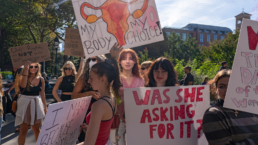Restricted abortion access will harm BIPOC youths’ chances to build stable adult lives.
By Shriya Bhattacharya, Prism
The stage seems set for a U.S. Supreme Court reversal of Roe v. Wade almost 50 years after the ruling found restrictive state regulation of abortion to be unconstitutional, which would have drastic consequences for pregnant people across the country. While older reproductive justice advocates are ready for a resurgence of all-too-familiar barriers to reproductive rights, many in Gen Z have lived their entire lives with the nominal protection afforded by Roe v. Wade. The prospect of building an adult life in a country even more hostile to reproductive rights is yet another specter looming over a generation already struggling with climate change, rising white nationalism, economic uncertainty, and other social inequities, especially in the wake of COVID-19.
“We should be teenagers; instead, we’re having to worry about what could happen to our bodies and what could happen in the future,” said Haley Reyes, a 16-year-old in Texas, which recently passed the severely restrictive Senate Bill 8.

Texas isn’t the only state that has limited reproductive rights; the Guttmacher Institute has reported that 31 states, including Florida, Kentucky, and Oklahoma, have introduced new abortion bans this year alone. Additionally, 13 states have passed “trigger laws,” which will make abortion illegal if Roe v. Wade is overturned. Despite the increased attention on reproductive justice right now, efforts to chip away at abortion access in the country have been years in the making. Conservative attorneys spent decades bringing forth cases that undermined Roe, hoping that one day the Supreme Court would overturn the ruling altogether. In her article for Vox, Jillian Weinberger also noted that when Roe v. Wade was made official 50 years ago, Democrats treated the ruling as a “largely settled matter” while the anti-abortion movement spent considerable resources and time building out a pipeline of judicial nominees who would be partial to reversing it. Now it seems that anti-abortion supporters will reap the fruits of their labor while people seeking reproductive health care pay the costs.
Recent Posts
‘Unconstitutional. Unethical. Authoritarian.’ ICE Bars Millions Of Immigrants From Bond Hearings
July 18, 2025
Take Action Now One watchdog said the new policy “seems like a blatant attempt to stop them from exercising their right to due process.”……
Americans Are Not Nearly Alarmed Enough About Climate Change
July 18, 2025
Take Action Now Americans still don’t comprehend how imminent, dangerous, and far-reaching the threat is—and journalists are partly to blame.By…
The IRS Is Building A Vast System To Share Millions Of Taxpayers’ Data With ICE
July 17, 2025
Take Action Now ProPublica has obtained the blueprint for the Trump administration’s unprecedented plan to turn over IRS records to Homeland Security…
Israel’s Sudden Assault On Syria Is Unchecked Aggression
July 17, 2025
Take Action Now Jerusalem is bombing Damascus and threatening al-Sharaa’s rule, while Washington was hoping to help the nascent government on…




